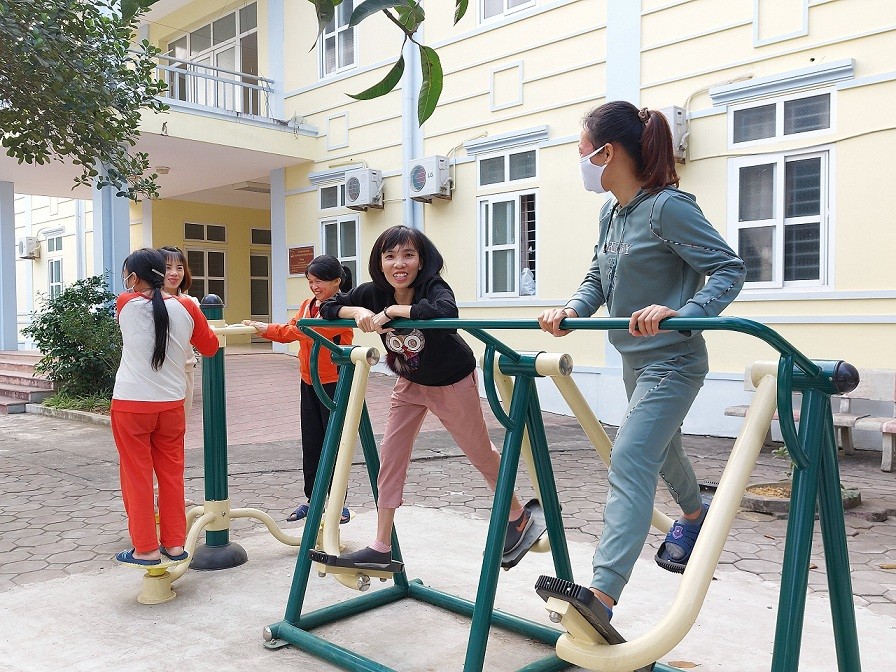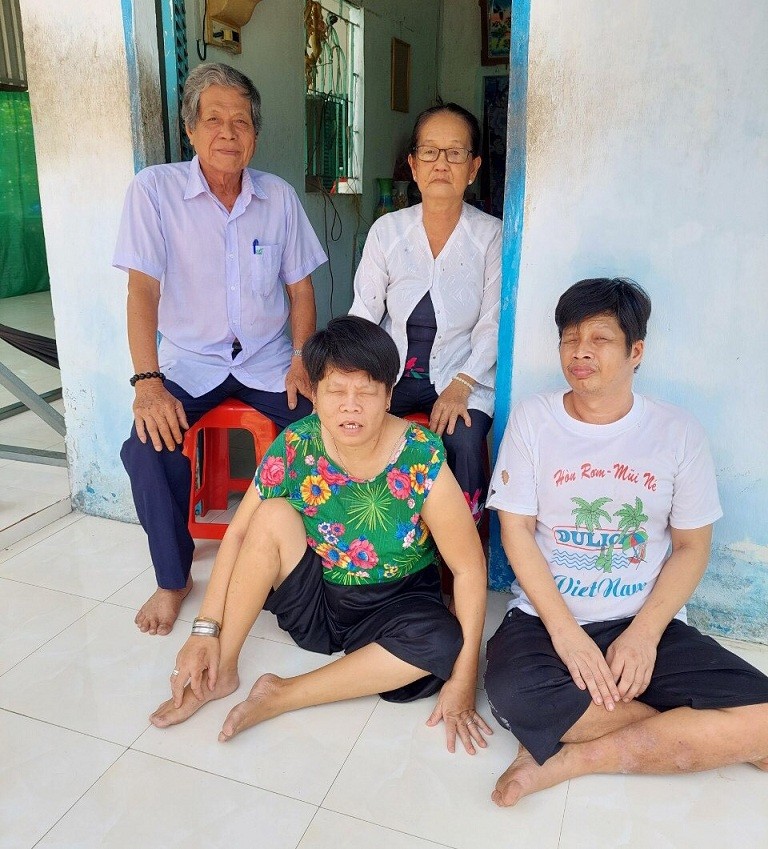
The victims of Agent Orange refuse to submit to fate
Latest
Coming to the Vietnam Centre for Social Protection for Agent Orange/Dioxin Victims in Thach That (Hanoi), everyone sees the lively face of “orange-skin” Vuong Thi Quyen - who is both a clerical worker and manager of the library - fanpage, and an IT teacher at the Centre.
Miracle of the “orange-skin” girl
The girl born in 1989 in Quang Trach district, Quang Binh province, confided: "I am quite busy every day, but I still wish that after this training course and after the IT classes are over, I will have another class to teach others affected by Agent Orange and those with disabilities from other provinces.
I hope that others with disabilities like me can find suitable work, have stable jobs to support themselves and find joy in life. I feel compassionate for my orange-skin brothers and sisters in many places, especially those in rural areas who don’t have access to technology.”
 |
| Vuong Thi Quyen (black shirt) along with friends in the Vietnam Centre for Social Protection for Agent Orange/Dioxin Victims, Thach That district (Hanoi). (Photo courtesy of the interviewee) |
Being the youngest-born in the family, Quyen was born healthy like any other child. But when she turned 9 years old, Quyen had a hunchback and scoliosis due to inheriting Agent Orange/dioxin from her father, who fought in the war against the US in the Southeast region and Central Highlands.
When her family found out, they took Quyen to many places for treatment, but the disease did not get better. Since then, she also experienced muscle pains, became skinnier, the tumor on her back gradually grew bigger and walking became more difficult.
When she turned 10, Quyen suddenly became repulsed, disappointed, desperate and scared when her parents took her to many places for treatment, but only received a helpless shaking head from the doctors. Quyen even thought about death many times to free herself and not to burden her family.
However, family is the warmest place for Quyen to feel safe, ignore the malicious comments from others, and study hard to please her parents.
In high school, she would bike 4 rounds (about 28 km) every day from her home to Nguyen Binh Khiem High School to study with her friends. Instead of having a bulging back because of the familiar backpacks like her classmates, Quyen's tumor was getting bigger and bigger, and there was a lot of pain in the bones, especially with the changes of weather.
After she graduated from high school, Quyen chose to study Informatics at Quang Binh University, to benefit her own health. At the start of 2012, Quyen was accepted to work at the Association of Victims of Agent Orange/dioxin in Quang Trach District.
After more than a year of working, she was fortunate to receive a scholarship to study Journalism and Communication at NIILM University, Haryana (India) under the programme "Searching for young female talents" of the Vietnam Association for Victims of Agent Orange/dioxin.
Sharing information about studying in India, Quyen said that it was the most difficult time because it was the first time she had to leave her family for a place where no one knew her. When she first arrived, she did not know English, everything was new and different.
However, with the help from the school, international friends, and Vietnamese brothers and sisters in India, Quyen finished the 3-year course with an excellent degree and ranked 4th in the class, impressing teachers and classmates.
In 2018, Quyen was employed as an archivist at the Vietnam Association for Victims of Agent Orange/dioxin in Quang Binh. After a year, she was moved to the Vietnam Centre for Social Protection for Agent Orange/Dioxin Victims and has worked there until now.
Here, Quyen got to participate in many programmes, activities, conferences, forums for victims of Agent Orange. She was also selected as the Ambassador of Agent Orange in the SMS campaign “Joining hands to ease the pain of Agent Orange victims in 2019” which aimed to call on organizations, ministries, departments, branches, benefactors, and international friends to send messages in support of Agent Orange/dioxin victims.
These opportunities have helped Quyen have more sympathy, an understanding of Agent Orange, the challenges, difficulties and the longing for a happy life like normal people of other Agent Orange victims like herself. She also tried to learn more in order to support her work and help other Agent Orange victims move forward together.
Four decades of motherhood
Everyone in Truong Phu A hamlet, Truong Long commune, Phong Dien district, Can Tho City all look up to and sympathize with Tran Thi Chanh’s family. Among 4 members of the family, Chanh and her two children are all victims of Agent Orange/dioxin.
Speaking about the consequences of the war that had affected her children, Chanh shared: “When I was 14 years old, I left my family to join the army as logistics. When I was 16 years old, I joined the Youth Volunteers force at U Minh Thuong, Kien Giang province, belonging to Battalion 1C, responsible for transporting goods and bringing wounded and sick soldiers to the base for care and treatment. In 1975, I got married, returned to my hometown and, since then, I have actively participated in social work.”
 |
| Chanh along with her husband and her two children who were affected by Agent Orange/dioxin. (Photo courtesy of the interviewee) |
In 1982, Chanh gave birth to her son, but right when he was born, he could not open his eyes until half a month later. However, his eyes were dark red and as he grew up, they became blurrier and he could not open them wide enough to see clearly. His legs were also too weak to walk and he was only able to crawl around the house. His nerves were unstable, so he would sometimes laugh and then cry naturally.
In 1985, Chanh continued to give birth to her daughter but her condition was the same as her brother’s. The couple then decided to put off having more children to be able to thoroughly take care of her pitiful children who had no hope for tomorrow.
The most difficult period was when her children regularly fell ill. However, the hospital was 40 km away, so every time one of them got sick, one parent had to take that child to the hospital, while the other stayed home to look after the remaining child. Every five times a fortnight, the couple would take turns taking the children to the hospital until they got to go home.
Despite the difficulties, the two husband and wife still actively participated in the local social work. Their shabby and empty house is lit up by certificates of merit and medals recognizing the results of their many years of hard work.
Tran Van Son, Chanh’s husband, shared: “I have 27 years of experience in local social work and my wife also has 25 years of working in the Women's Union and the Population and Family Planning Association. She only retired recently due to poor health and eyesight, and the children also need more dedicated care.”
Currently, due to Chanh’s old age and poor health, her family mostly relies on the welfare policies of the Government and local unions. However, she and her husband still vowed that, despite many difficulties and poor health, they would still encourage each other to do their best to take good care of their unlucky children.
| Agent Orange/dioxin has affected 4.8 million people in Vietnam (being in contact with and having it enter the body or living in areas with high dioxin residues in a diffused environment). Over 3 million people are victims (people exposed to Agent Orange/dioxin; suffering from illness, have reduced working capacity, infertility, or having children with deformities, etc.) According to incomplete statistics, the country currently has over 150,000 second generation victims; over 35,000 third generation victims; and over 2,000 fourth generation victims. Many families of Agent Orange/dioxin victims in our country have 4-5 or more family members exposed; many victims are unable to work, earn a living, or even control their own actions. |

















